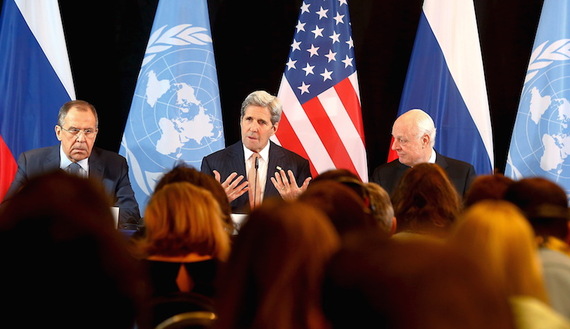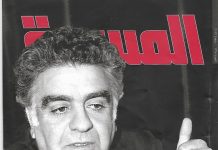Will US, Russia be able to turn ‘words on paper’ into action in Syria?
Laura Rozen/Al-Monitor/February 12/16
MUNICH — World powers led by US Secretary of State John Kerry and Russian Foreign Minister Sergey Lavrov announced that they had agreed on an ambitious plan for rapid humanitarian aid delivery to seven besieged areas in Syria, including air drops to territory held by the Islamic State and a temporary “cessation of hostilities” to be worked out over the next week.
Under the plan, announced by Kerry and Lavrov at a midnight press conference in Munich after six hours of grueling meetings involving some 18 nations, the United Nations would convene two task forces, each co-chaired by the United States and Russia. One task force would begin work in Geneva this weekend to organize and oversee implementation of humanitarian aid delivery to the most besieged areas in Syria. These include not only areas accessible by truck convoy that are besieged by Syrian government forces and their allies, but one town, Deir ez-Zor, held by the Islamic State, where the plan is to air-drop assistance.
The second task force would aim to organize a cessation of hostilities, or temporary truce, with the goal of getting the Syrian government and rebel groups to agree to freeze fighting in one week’s time and eventually to work toward a broader and more lasting cease-fire.
The plan, Kerry acknowledged, was hugely ambitious, and it remains to be seen, he said, whether the words in the communiqué unanimously agreed to by the 20-member International Syria Support Group (ISSG) could be translated into facts on the ground.
“Everybody today agreed on the urgency of humanitarian access,” Kerry told journalists at the joint press conference with Lavrov and UN Syria envoy Staffan de Mistura Feb. 12. “And what we have here are words on paper. What we need to see in the next few days are actions on the ground in the field.”
With attention in Munich focused on rapidly producing concrete humanitarian deliverables and a reduction in violence in Syria, ambitions receded for a near-term resumption of the intra-Syrian political talks in Geneva. For now, that might suit both the Syrian opposition, currently pushed back on its heels, and the Damascus government, emboldened by its recent military gains, backed by Russian airstrikes. A permanent end to hostilities, however, would not come without an eventual political resolution, Kerry asserted.
“We have no illusions about how difficult that is,” said Kerry. “No one here is following some pipe dream in this effort. People fully understand that compromise will be necessary, that it will be essential to resolve very tough issues that are outstanding. But without a political transition, it is not possible to achieve peace.”
In a demonstration of the international group’s effort to try to rapidly translate the ambitious plan into action and lessen the misery of millions of Syrians, the de Mistura announced only hours after the ISSG Munich meeting that the first gathering of the ISSG task force on humanitarian aid would hold its first meeting Feb. 12 at 4 p.m. in Geneva.
The ISSG plan is based on a US text brought to Munich, a former Gulf-based diplomat said. On aid delivery to the seven most besieged areas, the ISSG communiqué states, “In order to accelerate the urgent delivery of humanitarian aid, sustained delivery of assistance shall begin this week by air to Deir Ez Zour and simultaneously to Fouah, Kafrayah, the besieged areas of rural Damascus, Madaya, Mouadhimiyeh, and Kafr Batna by land, and continue as long as humanitarian needs persist.” Russia said it would begin work with the Syrian government to coordinate air drops of food by helicopter into Deir ez-Zor in the coming days.
The other major plank of the new plan would bring US and Russian diplomatic and military officials together in the task force to try to lay the groundwork for an eventual cease-fire, beginning with what the diplomats called a cessation of hostilities.
“The ISSG members decided to take immediate steps to secure the full support of all parties to the conflict for a cessation of hostilities, and in furtherance of that have established an ISSG cease-fire task force, under the auspices of the UN, co-chaired by Russia and the United States, and including political and military officials,” the ISSG communiqué states.
Lavrov said he welcomed in particular that the new plan calls for more military coordination between the US-led coalition and Russia in Syria, a goal he said Russia has long sought but until now had been rebuffed. He acknowledged that Russia’s targeting of rebel groups beyond the Islamic State (or Daesh, as he calls the organization) and the al-Qaeda-affiliated Jabhat al-Nusra has been a long-running source of “emotional” arguments within the international Syria contact group.
“As you probably know, during all these months we had quite an emotional discussion on who is … striking at [the] right targets, who is striking at wrong targets,” Lavrov said at the press conference with Kerry. “We have been proposing on many occasions to deal with this issue. … Now, having the agreement that the task force will determine areas taken by Daesh and Jabhat al-Nusra. We have made a very important practical step forward in this direction.
“I would also like to underscore that, for the first time in our work, the document that we have adopted today stipulates the need to cooperate and coordinate not only political and humanitarian issues, but also the military dimension of the Syrian crisis,” Lavrov said. “This is a qualitatively new change in the approaches, and we welcome it. We have been calling for it.”
The Munich meeting was the first to bring Kerry and Lavrov together face-to-face since Syria peace talks collapsed Feb. 3 in Geneva amid Russian-backed Syrian regime gains on Aleppo. It is also the first time that Saudi Foreign Minister Adel al-Jubeir and Iran Foreign Minister Mohammad Javad Zarif have been in the same room since Riyadh broke off diplomatic relations with Tehran following an attack on its embassy there on Jan. 2.
“Many had wondered whether there [were] tensions in the region that would not allow some countries perhaps to be part of it,” de Mistura said at the press conference with Kerry and Lavrov. “We were able today to witness exactly the contrary. Saudi Arabia was there, Iran was there, everyone was there; and they were there determined to spend hours in order to discuss this.”
The next days will be a “good testing time,” de Mistura said. “Are the Syrian people going to see these outcomes? Then they will believe in future conferences, and they believe in their own future. And the ISSG has shown that they are ready to commit themselves.”
There were signs, however, that the Syrian opposition, as well as some of its regional backers, were prepared to improve its position should the attempt at a truce break down, an event that is not difficult to imagine.
Salman Shaikh, a former UN official attending the Munich talks, told Al-Monitor Feb. 11 that if it doesn’t work, “The opposition has a Plan B.” They would expect their core supporters and friends to up their military support.
Kerry also signaled that the Syrian opposition might not be prepared to give up the fight for broader political change in Syria instead of reaching an accommodation with President Bashar al-Assad.
“What we got last night on this cessation of hostilities represents what the opposition wanted,” Kerry said at a meeting with China’s Foreign Minister Wang Yi Feb. 12. “They wanted it called and defined as a cessation of hostilities. That is very much in line with their thinking and their hopes.”





















